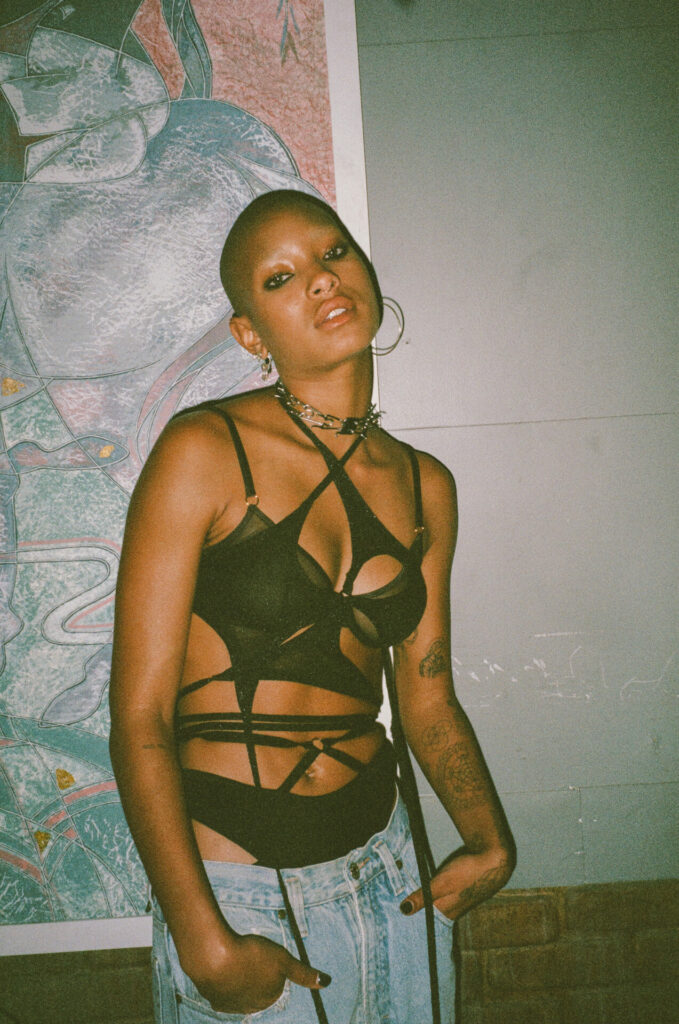WILLOW wants you to be the beautiful, amazing person you’re meant to be
The Gen Z alt rockstar delves into the mystery and meaning behind her high-octane new record, ‘Coping Mechanism’

WILLOW has developed a natural aversion to the media. Having spent years under the spotlight, not just due to her family name (her parents are actors Will and Jada Pinkett Smith; her brother Jaden) but also as a child pop star (she became a viral sensation aged nine with her online anthem ‘Whip My Hair’ in 2010), she is understandably wary of being misunderstood. “I don’t really like headlines,” the 21-year-old singer tells Rolling Stone UK, “but I do like messages.”
It’s been only a few hours since the pop-punk prospect hit the main stage at Reading festival when the singer hops onto Zoom. Over the years, WILLOW has emerged as a freewheeling musical spirit dabbling in everything from mystic R&B styling to punk-inspired tunes, but at Reading, she launched into her current image of disaffected rock and rage. She’s long left behind any preconceptions that might come with her family name, a singular path reflected in her mononymous stage moniker. “I’m very different from my parents, naturally, so I wasn’t really afraid of [being compared],” she explains. “I just wanted to make it clear about where I stand. I don’t need to prove anything at all.”
Now, moving onto her second rock-heavy album, Coping Mechanism, WILLOW’s emotionally extreme creative ambitions are steered towards an era on her own terms. “All of my albums complement each other because the common denominator is me,” she says, her voice heavy from last’s show. This has resulted in an album with fewer guest features (unlike its punkier precursor, 2021’s LIFE, aka lately, i feel everything), though there is the input of friends and producers Chris Greatti and and Yves Tumor. “I’m just always trying to make people happy and find themselves,” she says. “I try not to look for validation in other people. The more connections artists can bring to the world, the better and I can’t think of a better reason to make music.”
Did Coping Mechanism have a central concept from the beginning or did it evolve over time?
WILLOW: I was thinking about the concept in 2018. I always knew I wanted to make this album, I just knew that the music wasn’t good enough. So it was really just a matter of time until I heard what the album was supposed to sound like. The first time [producer] Chris Greatti and I got in the studio. I had been saying ‘Oh no, I’m not making an album I’m just chilling.’ And then after that session, I was like, ‘This is Coping Mechanism, this is the album I’ve been wanting to make.’ I heard the sound and I knew it. I just knew it.
I probably hadn’t talked about it since 2018, but it was still in my mind, and I still knew that album was going to come from me at some point and now just happened to be the time.
You’re making rock music right now but you’ve played with all kinds of genres. What motivates you to try something new?
WILLOW: I started doing music at such a young age, I feel like [playing with genre] just became a part of me and with my music. The general state that I’m in on an everyday basis, and the direction that my music goes, are very connected. I definitely could not make the music that I make if I wasn’t willing to be vulnerable and to speak about difficult personal experiences. I’ve always been inspired by rock music.
What’s one of your most vivid music memories?
WILLOW: I would be in these small clubs that my mom would be playing in [with her band Wicked Wisdom] — obviously way too young to be there, but she always wanted her kids with her. I remember watching her every night just go up on stage, and regardless of if they were screaming racist slurs at her or not, she performed the same way, with the same amount of passion every time. That’s very inspiring to me. I was seven or eight and she was on Ozzfest. She was touring a lot in the early 2000s.

‘Hover Like a Goddess’ is a confident anthem of sexuality. How did that song come together?
WILLOW: Yes, it is! I think that every woman should be treated like a goddess. The beauty and the divinity of the woman is just unprecedented, and just beautiful. In this day and age, there’s a lot of political violence against women. I can’t think of a time when there wasn’t — and just regular violence in general. I wanted the song to be a fun and uplifting way to express my gratitude for the feminine.
Now you’re leaning into a heavier sound. What do you make of how the alternative scene is changing?
WILLOW: Spaces were previously gatekept by primarily white, male, older people — not even just in music, but in politics, in all sorts of different branches. In this day and age, the old white male majority is not going to be a thing anymore, which is beautiful. That’s the zeitgeist right now. People are aware that inclusivity has not been a thing for a long time; now, we’re ready to change that. We’re bringing a new, more positive, more inclusive connection and environment.
You’ve begun to open up more about your bisexuality online and in your music. Why now?
WILLOW: The LGBTQ+ community, women, and people of colour, we have all experienced feeling marginalised and feeling like we don’t have a place, and we don’t belong. I want to be a space where the LGBTQ+ community can feel heard and seen and feel like they can now move forward in their life with some new understanding.
“I want this album to show that anyone can have their heart broken by so many different things. Romantic experiences aren’t the only thing that can break your heart”
— WILLOW
How has the evolving sound of your previous album LIFE and Coping Mechanisms helped you got as a musician?
WILLOW: I worked so hard during LIFE (lately, I feel everything) with my vocal coach. We drilled this entire new album on the treadmill so many times. I really went into training to really get my voice right and ready for this next tour and this next album. If someone had given me these songs last year, I couldn’t sing them, 100 per cent. The album wouldn’t be made if I couldn’t sing it. I don’t play the studio recording magic game. I don’t play that. If I can’t sing it, it’s not being sung.
Do you find there’s a difference between the stage versions of WILLOW and Willow Smith?
WILLOW: I didn’t want my artist name to be Willow Smith because I don’t want to be judged or compared to my family, you know what I mean? I’m a completely different person. I have a completely different way of looking at the world and a completely different set of skills. I really am just WILLOW. I feel like anything that I do, I try to bring my heart into it. I try to just bring ‘me’ into it. Anything that I do, I make it my own.
‘Perfectly Not Close to Me’ deals with the emotional toll of stress and anxiety: “You don’t want to talk shit but I’m so fucked up just like this.” How did you relate to those lyrics?
WILLOW: I feel pressure, internally, to become a better musician. I want to work harder on knowing the names of the notes. I sing in ways on this album that I never have before. I really want to challenge myself to hit all of those notes on-stage and just grow as a performer. I need to be thinking very deeply about my technique more than I have before so it’s definitely internal pressure to just evolve and to be better.
Yves Tumor and Chris got in the studio and, on the tour bus, we were just messing around with some of the demos he’d done. He said ‘pressure I can’t describe’ and I’d laid that verse. It just clicked with me. A lot of the time our biggest enemies are ourselves and our minds and our negative thoughts and that was what I was talking about.

How does Coping Mechanism differ from your explosive record lately i feel everything?
WILLOW: We all have different coping mechanisms, and those — depending on what they are — are very indicative of our mental health and our emotional state. We need to analyse them and look at them and be like, ‘OK, why do I do this?’ and ‘What even are my coping mechanisms?’ and I think that’s a huge, huge first step. Everyone struggles with their mental health. Whether that be being a people pleaser, getting validation from others, or drugs or alcohol. We all have our own little coping mechanisms and taking the steps to heal is the most important thing we can do.
Did the central theme of the record have another alternative meaning?
WILLOW: I want this album to show that anyone can have their heart broken by so many different things. Romantic experiences aren’t the only thing that can break your heart. So, anyone who has experienced any pain or their heart needs a place to allow itself to feel and be human, I want this album to inspire people to have that emotional catharsis and to purge all of their feelings of unworthiness to grow into the beautiful, amazing person that they’re meant to be.
Coping Mechanism is your fifth album. What does that milestone mean to you
WILLOW: I’m just really, really proud of the quality of the music. I’m so proud of how much I’ve grown. These are some of the best lyrics I’ve ever written and some of the best melodies I’ve ever written. I’m just really happy and proud of that.
WILLOW’s new album Coping Mechanism is out October 7.
